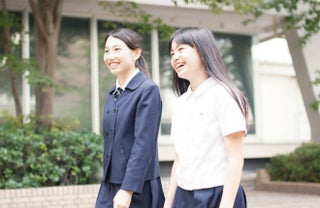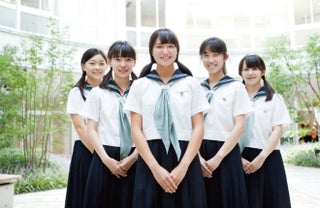Springでは日本の大学で学んだ経験のあるアジアの学生に日本で学ぶことの魅力や日本・日本語への興味についてお話を聞いています。
シリーズ14人目は、法政大学グローバル教養学部(GIS)で学ぶヒュウ ・ウェン・フイ・レニスさんです。
Name: Ms. Hew Wen Hui, Lenice
(ヒュウ・ウェン・フイ・レニス)
"I know it is notoriously difficult to master Japanese, but once mastered, I am sure it will become my strength."
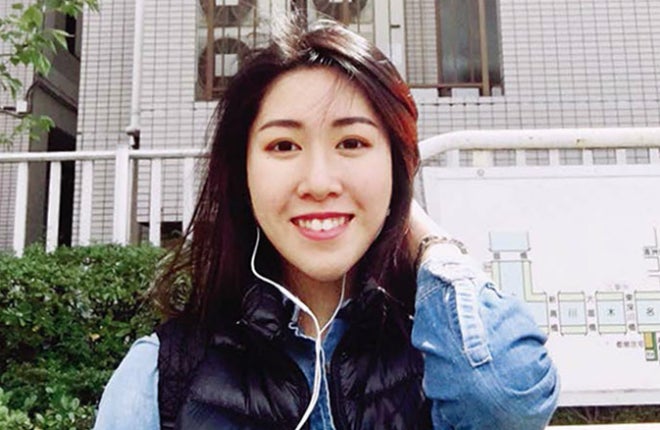
Currently studying at Global Interdisciplinary Studies (GIS)at Hosei university in Japan.
Educational Background
-Primary School: SJK(C) Jalan Imbi, SJK(C) Serdang Baru 2 (Malaysia)
-Secondary School: SMK Sri Sentosa (Malaysia)
-Pre-University: Methodist College Kuala Lumpur (A-level) (Malaysia)
Q. What made you decide to study in Japan?
I had an opportunity to visit Japan for one week when I was still a Pre-University student in Malaysia. I found the country to be the safest place to study and travel and was also fascinated by its deep culture. Meanwhile, I must admit that I was influenced by my father, who can speak fluent Japanese. When I was younger, I always wanted to be able to understand Japanese movie without reading the subtitle. Although the Japanese language is notoriously difficult and less-commonly studied worldwide compared to other major languages such as French and Spanish, I was quite sure, once mastered, it would be great advantageous from unique opportunities unavailable to most people.
Q. Please tell us about your campus life.
Among all the universities in Japan the most important fascination that drove me to apply for GIS at Hosei University is the fact that the courses are offered in English. Further, their courses would expose me to a variety of disciplinary perspectives, providing me the opportunity to embrace diverse ideas and philosophies. I strongly believe that studying in GIS would help me grow academically and professionally since its liberal arts education combines academic skills courses in traditional fields of study, which will cultivate a truly global perspective. Basically, I have 2-3 classes each day during weekdays which I think it is quite occupied since I spent average 4.5 hours studying daily. In my opinion, university students in Japan are certainly clever, as well as having the natural aptitude to do well in university.
Q. How do you enjoy your life in Japan so far?
Needless to say I enjoy learning my Japanese language every day and trying to use it such as when I am asking for directions, buying food and even asking for help. I started learning Japanese in the second semester of my 1st year at Hosei University, and it is still not easy for me to differentiate when to use “を”, “は”, “に”, “へ”, “で”, and “が” in the sentence. Despite such challenges, I believe that acquiring the Japanese language enables me to comfortably express myself not only in university compound, but also in my daily life. Although I already speak Chinese, Malay, English, and Cantonese, this new language has opened my perspective on the values that other Asian nations share with Japan including religious beliefs, ethics, and aesthetics.
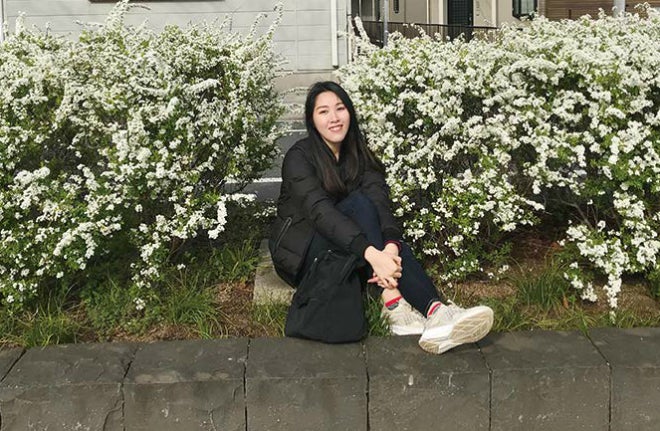 At the riverbank near my house.
At the riverbank near my house.In terms of activities, I usually stay at home on weekends to finish my assignments and review topics that are going to be discussed next week. I also take a stroll along the riverbanks near my house in the evening to see if there are any picture-worthy trees by season, like cherry blossoms in spring. Having four distinct seasons has been a very pleasant change for me, who came from Malaysia, where it is warm and the season/ weather is monotonously the same all year round. Here the activities, eating habits, dress and even the mood of the people change as the season changes. It is wonderful to watch the surroundings gradually change as the time passes by.
Q. Please tell us about your future dream.
At first, with the gifted ability to communicate in several different languages, I had always planned to become a translator or even work in multi-national companies. However, during my studies in Hosei university I have developed strong interest in international and politics field to pursue a career as a diplomat. Currently, I am taking more courses from the international relations and governance discipline, which cover a broad range of areas such as economic interdependence, international organizations, terrorism, poverty, human rights, and climate change topics. Being multi-lingual, I am keen and determined to achieve my career goal in the future to play an active role not only in Japan and Malaysia but around the world.
Q. Any message to students who are considering to study in Japan?
To be honest, studying in Japan may not be as easy as you might think. No matter how mentally or physically prepared you are with the knowledge of Japan, the unfamiliar social norms, cultural differences and personal interaction with the locals may still be challenging and hard to accommodate. I struggled to adjust myself with the new environment and was very passive during my first year until I took my first step. I do understand that there are times when all the negative vibes kicked in,
it is somehow tiring and defeated and you may feel like giving up and run back home. But always bear in mind that “hardships often prepare ordinary people for an extraordinary destiny. -C.S.Lewis".Don't be fed up but stay persistent for the choice that you have made.Be yourself,take responsibility because your life is yours to live.
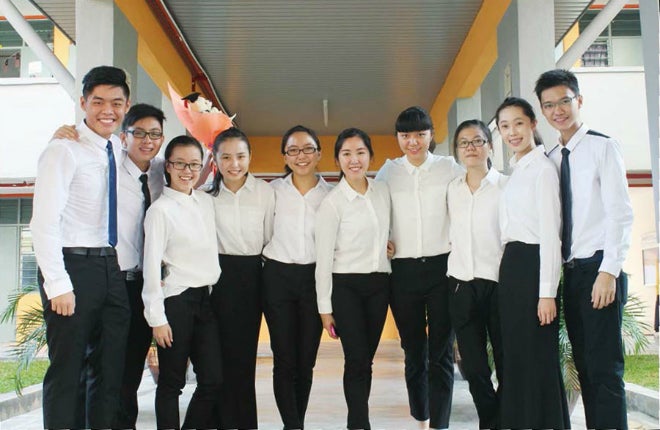 Me (5th person from right) and my classmates at a high school graduation in Malaysia
Me (5th person from right) and my classmates at a high school graduation in Malaysia
Visit the pages to read about other students studying in University of Tokyo, Nagoya University, ICU and more!
東京大学、名古屋大学、国際基督教大学、大阪大学などで学ぶ留学生の皆さんの記事はこちら
<Study in Japan>
https://spring-js.com/education/education01/study-injp-and-jp/










